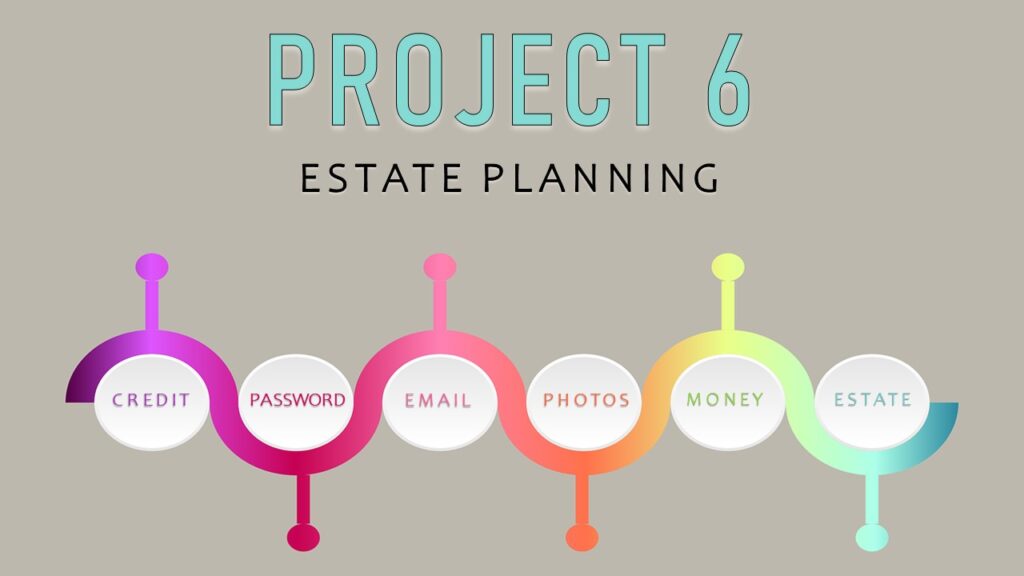Financial health—how to balance a checkbook, create a budget or plan for retirement—isn’t taught in…
Create Your Estate Plan

Estate planning requires us to confront many challenging issues. For some, the thought of facing their mortality is difficult, at any age. Others are daunted by this complicated undertaking, and they’re afraid to make a mistake – so they do nothing. It’s easy to become overwhelmed by all the options and arduous decisions to be made. When you understand what comprises an estate plan and how it can be used to not only protect your assets, but to ensure your wishes are known to others, you begin to remove obstacles and eventually the roadblock. I turned to Danielle G. Van Ess, Attorney & Counselor at Law at DGVE law, LLC for her guidance as I wrote this blog. You’ll find her excerpts and links to more in-depth content from her blogs throughout this post.
Contrary to popular belief, an estate plan is not simply about filling in some documents; it’s having a plan that communicates for you when you can’t. It’s establishing a strategy for what you want to happen to your assets and belongings; as well as lifetime medical and end of life wishes, care of children and legacy for adult children and grandchildren. It’s not just about money and possessions, it’s also about our bodies, our families, and our personal choices. Whether your only asset is your checking account, or you own your own home, or even have children or a business, an estate plan helps ensure that your wishes are met if you die or become incapacitated. Having an estate plan that you comprehend and are confident in will provide peace of mind for years.
Common Questions
What is an estate plan?
An estate plan is a broad term encompassing all your instructions regarding how you want your assets, healthcare decisions, and family matters handled if you die or become incapacitated. The goals of your estate plan can be expressed through a variety of documents, that may include the following:
- Will
- Trust
- Power of attorney
- Health Care Proxy
- Health Care Directives
- Appointment of Guardians for Minor Children
Do you need an attorney to create an estate plan?
Estate law is an extremely complicated discipline; if it’s not implemented correctly, mistakes, oversights, or omissions may only come to light when it’s too late. For peace of mind, choose a qualified professional to tailor the language and provisions to meet your specific circumstances and wishes. I strongly encourage my clients to hire an attorney who focuses on estate planning to build and implement an estate plan you can trust for years to come.
Your relationship with your estate attorney will be ongoing, so take the time to find an attorney you’re comfortable with. It’s okay to call an attorney to ask what their process is, how they bill, and set up a meeting to chat about your estate planning needs. Don’t overlook this step. You need to feel at ease discussing your plans with your attorney, confident asking questions and certain you are being listened to, as well. If you don’t connect with the first person you meet, call a second or third.
At what age should you create an estate plan?
In short, estate planning starts at age 18. When you become an adult, assign someone to speak for you and make medical decisions when you cannot. After this initial step, key life events will prompt the need to update your estate plan. Your attorney can help you decide if it’s best to have your assets owned in a Trust, and what type of Trust. You should communicate every few years with your attorney to keep your wishes current and your assets protected.
Where to keep important documents?
Important documents may seem like they belong in a safe deposit box; when actually, the original should be easily accessible when needed by the person you have assigned as the agent in those papers. Meaning the person who needs to act, knows where to find the documents or whom to call for help (i.e., lawyer) when the time comes.
Without access to the right documents, your agent won’t be able to make decisions or access funds promptly on your behalf. For documents you want to secure, it’s essential that someone you trust is aware of the contents and has access to your safe deposit box or home safe, so they can retrieve necessary documents if you’re unable to do so. Unless your home safe is bolted to your house, it may not be the best place to keep your originals.
Danielle: Make sure your doctor’s office has copies of your health care directives (HIPAA Authorization, Health Care Proxy, Living Will, Declaration of Anatomical Gifts, and Final Disposition) in your file.
Financial Estate Planning Documents
Last Will and Testament:
Anyone who owns an asset: vehicle, house, checking and savings accounts, investments, life insurance, personal possessions, business, etc., can create a Will to transfer those assets to their loved ones. If you die without a Will, there is no guarantee that your intended desires would be carried out. Having a Will can help to minimize conflicts about your estate that may arise. A simple Will generally:
- appoints someone, formerly called an Executor and now called your Personal Representative, to handle your individually owned assets
- specifies who should receive those assets upon your death
- nominates guardians for children who are minors
- establishes the “who, what, and when” of your estate plan
Personal Property Memorandums:
In Massachusetts, a document containing information regarding who should receive tangible property after the owner’s death can be included as an addendum to a Will or Trust. This may be created either before or after the Will is executed and does not need to be notarized. It does need to give enough details about each object that there is no question what the items in the list refers to.
A Trust:
Commonly, a Trust provides for your loved ones, but some trusts can also protect your assets. A Trust is similar to a Will and comes in countless forms, including the most basic kind called a Revocable Living Trust. (Revocable living trusts do not provide asset protection.) Trusts should be created with an attorney to precisely meet your needs, properly protect, and transfer your assets.
- With a Revocable Trust, you can make minor amendments to modify the terms of your Trust, make big changes, or even completely revoke it as long as you are living. You have more control but less protection.
- With an Irrevocable Trust, you set it up, then relinquish control to the Trustee. Essentially, what’s done is done, and you no longer control whatever is in the Irrevocable Trust.
Danielle: There are many different kinds of trusts for different purposes. Some trusts are primarily designed to avoid problems accessing accounts in the event of your disability, avoid unnecessary frustrations, delays, and expenses of administering your estate after you die, and ensure that whatever you have goes to the people you want when and how you want. Other trusts are designed to provide preserve assets for your beneficiaries or in the event of prolonged medical expenses or possible future lawsuits, or to provide for a child or adult with special needs.
Power of attorney:
This document appoints someone, called your Attorney in Fact, to manage all your financial assets on your behalf in the event you become incapacitated. If you give someone a Durable Power of Attorney, it should be effective until you die or until you revoke the power granted to the agent, though in practice it is best to make sure your Power of Attorney is no more than 3-5 years old or banks and others may be reluctant to accept it.
Documents for Health Care
Health Care Proxy:
The document is the proxy, the person is the agent
Every legal adult (age 18+) needs this legal document designating someone you know and trust to make healthcare decisions for you if, for any reason and at any time, you become unable to make or communicate those choices yourself.
- request consultations and second opinions
- consent to or refuse medical tests or treatments
- making life-support decisions
- authorize a transfer to another physician or institution
You should have ongoing conversations with your health care agent so they clearly understand your wishes and would feel confident making those medical judgments, should they be asked to speak for you. You can appoint your spouse, partner, family member, or close friend as your health care agent.
- Once your child turns 18, you are no longer your newly-adult child’s legal guardian so they require a health care proxy. As legal adults they need to choose who will speak for them and have access to their medical information. Parents can pay for their 18-year old’s estate plan, but the child will be the client and make the decisions.
- Check that all of your family members, especially your elderly family members, have legally appointed someone to speak for them if they ever can’t.
- It’s all right to change your mind regarding your health care strategy. Review your wishes with your designated advocate and your doctor every few years to confirm your health care directives still comply with your wishes.
Note: In MA it’s called a Health Care Proxy, other states may call it a Health Care Power of Attorney or Health Care Directives.
HIPAA Authorization:
This document gives loved ones access to your medical information, and the right to speak to your doctors to understand your needs. A HIPPA authorization is even necessary to learn whether your loved one is in a particular hospital or about their condition in the event of an accident or emergency. The HIPPA also covers:
- discussing issues with the medical team and reviewing the medical chart
- getting medical records in the event of an accident
- asking questions and getting clarifications
- reviewing treatment options
- communication with insurance companies regarding claims
- interaction with facilities relating to admittance/discharge
Danielle: People often want to know right away what happened, why their loved one died, but without legal authorization it’s impossible to gain access to medical records for a clearer picture of what may have happened, including any possible medical malpractice. Without a proper HIPAA Authorization, people have to wait for the Court to issue Letters of Authority, which can take months.
An Advance Directive:
It is beneficial for every adult to communicate what life-saving procedures they’re comfortable with and what life-ending care and comfort measures they want to be given. These are important discussions to have as a family, so parents and children are on the same page long before there is a need. It’s especially important to have these conversations when your children turn 18, as they may be asked make choices for you now that they are an adult. You’ll want to be prepared to act decisively for anyone who has designated you as their health care proxy.
- A Living Will is a document stating your wishes regarding end-of-life medical care, including the treatments you do and do not want and if you want to donate your organs. Massachusetts does not have a Living Will law on the books, but they are recognized by judicial case law. Similar provisions are often included in your Health Care Proxy to help your health care agent better understand your preferences for medical care and reduce confusion or disagreement about the choices you wish people to abide by. You’re providing a guide for your agent to use if you’re terminally ill, seriously injured, in a coma, in the late stages of dementia or near the end of life. It’s most beneficial when you’ve reviewed and discussed this document with your health care agent.
- MOLST (Massachusetts Medical Orders for Life-Sustaining Treatment) The MOLST form (also known as the pink paper on the fridge) is usually appropriate for someone of any age with a serious advanced illness. This medical form communicates your decisions regarding life-sustaining medical treatments directly to your physician.
Make your wishes known!
A letter of instruction:
Letters of instruction are non-binding parts of your estate plan. However, they are a wonderful way to communicate to your loved ones and beneficiaries those messages you don’t want to include in the legal documents themselves. There should be one for your Personal Representative providing the location of your important documents, as well as a list of your financial assets, their location, account numbers, PINs, and passwords. Often, these are informal instructions that will help achieve your wishes. They might include health-care decisions, thoughts about your memorial or funeral, or just a sentimental message to loved ones.
For example, here are some of the most common questions to be answered for your Personal Representative or Trustee.
- Should there be an obituary? Where should it be published?
- Who should we notify? (Provide contact info for friends and colleagues)
- What type of service? (memorial, wake, funeral, military, celebration of life, etc.)
- Do you want to be buried or cremated?
- Is there a funeral home you prefer?
- Have you prepaid for your funeral?
- Is there a place of worship where you want your service held?
- Are there readings or songs you want used during your service or memorial?
- Who should we include to participate in the memorial or service?
- Would you like flowers from friends and family? Or donations to a charitable foundation?
- Is there an existing scholarship you’d want people to donate to?
- Should a scholarship be created in your honor?
- Is there a cemetery deed?
- What should happen to your ashes?
- Which restaurant would you like to cater the reception? Even just listing a few to choose from is great.
- Should there be an open bar at your reception? Or a champagne to toast a fabulous life?
- What is your favorite picture of yourself?
Even though the letter of instruction doesn’t require an attorney to write, it’s the part most people skip. On the other hand, I’ve witnessed many people have fun with this piece of the project. Some approach it as an opportunity to plan their last celebration and really go all out providing specifics. Others are more practical, providing enough details to relieve some of the burden from their grieving family and friends during a difficult time. Either way, many feel a sense of liberation about taking control of this aspect of their estate planning.
Danielle: People often think they’re doing their families a favor letting them make those decisions but it’s burdensome, and can, and often does, lead to anxiety and sources of friction between family members. It’s really a final gift to leave your loved ones, to let them just follow your instructions and understand what you’d want, so they can focus on grieving instead of on making big decisions in that moment.

If you’re motivated to begin or update your estate plan, you can find Danielle Van Ess in Hingham at DGVE law, LLC



